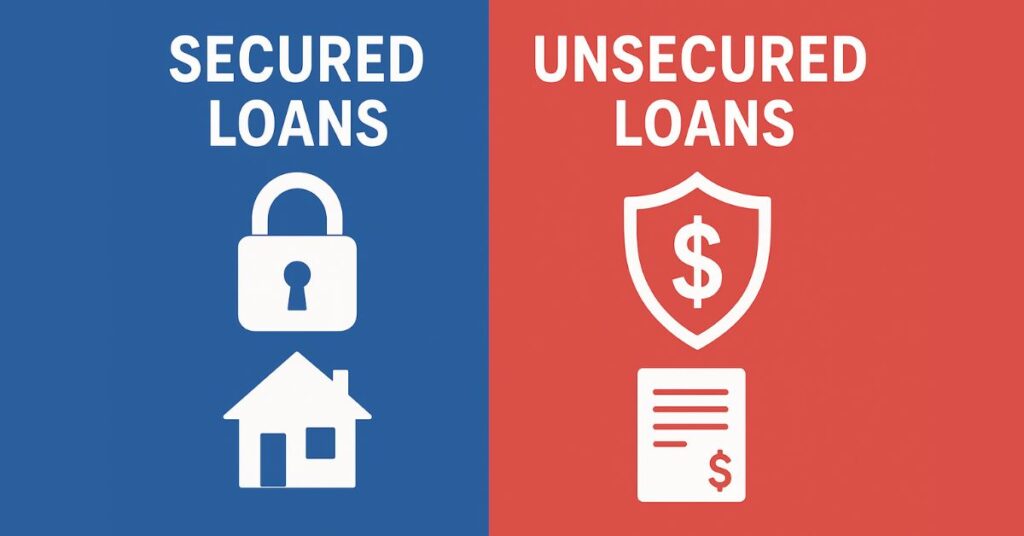

Secured vs Unsecured Loans What's Best for You?
When you avail a cash loan, there are two significant categories of personal loans: secured loans and unsecured loans. Both of them have pros and cons. Your decision will be based on your situation, needs, and personal preference. Understanding the difference between the two will allow you to make the correct decision on the loan that best fits your needs. Here, we’ll break down secured vs. unsecured loans so you can view at a glance the pros and cons of each and determine which might be the best for your use.
What are secured loans?
A secured loan is one in which the lender collateralized an asset (like a house, a car, or a savings account). In case the lender goes into default on the loan, he or she can take ownership of the asset to recover the debt amount. The asset being collateral reduces risk to the lender, and secured loans are a favorite among those wanting additional funds or who want to qualify for a lower interest rate.

Advantages of Secured Loans
Lower Interest Rates: Because the lender has collateral securing the loan, they risk less, and as a rule, this is reflected in the borrower paying a lower interest rate.
Borrowing More Money: You tend to borrow more money with a secured loan compared to an unsecured loan. The value of the object that you pledge as collateral will dictate how much money you can borrow.
Longer Repayment Periods: Secured loans have longer repayment periods; hence, it is convenient to pay installments on a monthly basis.
Disadvantages of Secured Loans:
Risk of Losing Your Asset: The worst drawback of a secured loan is losing your asset in case of default in repayment of the loan. For example, if you pledge your car or your house as collateral and default in repayment of the loan, the lender will take away the asset.
Lengthy Approval Process: Since the loan is secured through collateral, there will be a longer approval process because the lender will have to analyze the value of your property.
Collateral Requirement: Many individuals do not have valuable assets to offer as collateral, and hence this may make secured loans unaffordable to some borrowers.

What Are Unsecured Loans?
Benefits of Unsecured Loans
No Risk to Assets: The best advantage of an unsecured loan is that you are not going to sacrifice any valuable assets as collateral. In the event of default on the loan amount, the creditor cannot seize your home, car, or any other item of personal property.
Fast Approval Process: Without collateral, the approval of the unsecured loan is usually faster. That is an option that should work for you when you need to borrow in a hurry.
Flexible Use of Funds: Unsecured loans tend to have fewer limitations on how you use the funds. You can use them for various purposes, such as credit card consolidation, home improvement financing, or medical bills.
Weaknesses of Unsecured Loans
Higher Interest Rates: Since there is no collateral to guarantee the loan, lending is riskier. Hence, unsecured loans will have higher interest rates compared to secured loans.
Lower Loan Amounts: Since there is no collateral, unsecured loans carry lower loan amounts. If you need a lot of money, an unsecured loan may not be enough.
Tighter Eligibility Criteria: Banks will examine your credit history, income, and financial record more tightly. If you have a bad credit history or low income, you might find it difficult to get an unsecured loan.
How to Choose the Right Loan Type
Selecting the right type of loan depends on your financial situation, borrowing needs, and long-term goals. Below are the principal factors to evaluate before making a decision:
1. Loan Amount Needed
If you require a large sum of money, a secured loan may be the better option, as lenders are generally more willing to offer higher amounts when collateral is provided. For smaller borrowing needs, an unsecured loan could be more practical.
2. Interest Rates
Secured loans typically come with lower interest rates, making them more cost-effective for large borrowings. In contrast, unsecured loans often carry higher interest rates, which can make borrowing larger sums more expensive.
3. Risk of Losing Assets
With secured loans, you must pledge an asset — such as a car or property — as collateral. This is a suitable choice if you are confident in your ability to repay and comfortable with the associated risk. If you prefer not to risk valuable assets, an unsecured loan is a safer alternative.
4. Flexibility in Repayment
Secured loans may offer more flexible repayment terms, making them ideal if you require a longer repayment period. While unsecured loans are often approved more quickly, they may come with less flexibility in terms of repayment schedules.
5. Credit Score and Eligibility
If you have a strong credit score and steady income, you may qualify for competitive rates and larger loan amounts with an unsecured loan. However, if your credit history is less than perfect or you need a substantial sum, a secured loan may provide better approval chances and terms.
Conclusion
Both secured and unsecured loans have distinct advantages and potential drawbacks. Secured loans are ideal for those seeking large amounts at lower interest rates and who are comfortable pledging collateral. Unsecured loans, on the other hand, are suited to borrowers who prefer quicker approval, do not wish to risk assets, or need smaller loan amounts.
Before making a decision, carefully evaluate your financial position, the amount you need to borrow, and your repayment capacity. Always compare offers from multiple lenders to secure the most favorable terms and rates. Whichever loan type you choose, responsible borrowing and timely repayment will help you build and maintain a strong financial foundation.








Leave a Reply